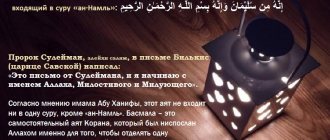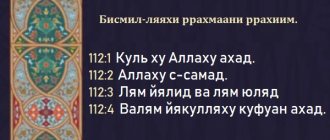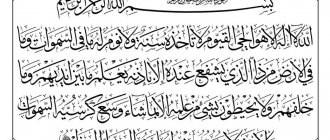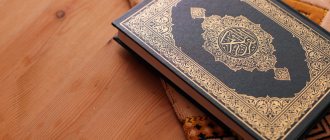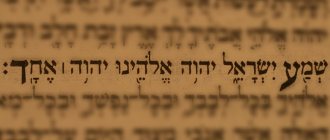Usually, after pronouncing the words Auzu billahi mina shaytani rajim, they say “Bismillahi Rahmani Rahim.” The meaning is translated from Arabic something like this: O Allah, protect me from the machinations of the accursed Satan or “I seek refuge in Allah from the accursed (stoned) Shaitan.” Pronouncing the words Auzu billahi minash-shaitanir-rajim is a recognition of the Omnipotence of Allah, a request for help, a weapon of protection available to believers from all dangers. Only the Almighty Lord can protect believers from the machinations of the shaitan; by uttering the words of istiazi, a Muslim testifies that he is helpless in front of obvious and invisible enemies.
Alhamdulillah pictures with inscription in Arabic
Praise be to Allah, the Lord of the worlds in Arabic. ٱلْحَمْدُ لِلَّٰهِ
May Allah make us of those who often remember Him and constantly praise Him for all good things. May the Almighty accept our prayers, forgive our sins and grant us the gardens of Paradise. There is nothing worthy of Him, all praise be to Allah, the Lord of the Worlds.
Prophet Muhammad (peace and blessings be upon him) emphasized that dua and dhikr are the most important element of the religious life of a believer. He taught us many dhikrs (remembrances of Allah), which, in all their simplicity, bring great blessings (barakat) to the lives of each of us.
Remembering Allah and turning to Him pacifies and calms the mind, and also brings success in this life and in the eternal life. Reading dhikr throughout the day while doing everyday things protects us from sin, increases caution, as it constantly reminds us of Allah (praise be to Him).
Psychology of Zikr
According to Duke University professor Harold G. Koenig, MD, more than 1,500 reputable medical studies indicate that religious people who pray regularly have better spiritual and physical health.
“The benefits of sincere religious practice, such as a sense of belonging to a religious community and deep faith, are that people cope better with stress and are generally better off because they have more hope, are more optimistic, are less susceptible to depression, anxiety, much more are less likely to commit suicide. They have a stronger immune system, lower blood pressure and are likely to have better cardiovascular function.”
The best and most authentic form of worship given to us by Allah is prayer, reading the Quran and dua. Thus, by sincerely submitting to Allah and making these forms of worship a part of our lives, we gain the keys to a peaceful and productive life. And if prayer in any form and in your own words is so powerful, then how powerful is the reading of the dhikrs taught to us by the Last Prophet (peace and blessings be upon him) on our well-being?
Such dhikrs bring peace, tranquility and contentment in life with constant connection with Allah. But a calm and healthy attitude is the key to productivity in any field, and there is no better source of happiness in life than closeness to Allah (Holy and Great is He).
The Prophet (peace and blessings be upon him) said: “Shall I inform you of the best and purest of your deeds before your Master, by which you will rise to the greatest extent and which is better for you than spending gold and silver, and better than meeting with your enemies who will cut off your heads and whose heads you will cut off?” They said: “Of course!” - (and then the Prophet, peace and blessings of Allah be upon him, said: “(This is) the remembrance of Allah Almighty" (Jami at-Tirmidhi).
Note that for this type of dhikr, ablution (wudu) is not necessary, although it is recommended.
Dhikr at any time of the day
1. Palm tree planted for you in paradise
سُبْحَانَ اللهِ الْعَظِيمِ وَبِحَمْدِهِ
Transliteration: Subhanallahil-'azimi wa bihamdihi
Translation: Glory be to Allah, glory be to Allah and praise be to Him
Benefit: The Prophet (peace and blessings be upon him) said: “For the one who says “Subhanallahi wa bihamdihi (Glory be to Him), a palm tree will be planted in paradise” (Jami at-Tirmidhi).
2. Reward for freeing a slave and protection from Satan
All rights reserved. وَلَهُ الْحَمْدُ، وَهُوَ عَلَى كُلِّ شَيْءٍ قَدِيرٌ
Transliteration: La ilaha illa-Allah, wahdahu la sharika lah, lahul-mulku, wa lahul-hamdu, wa huva ala kulli shayin kadiir.
Translation: There is no deity worthy of worship except Allah alone, Who has no partner, to Him belongs the power, to Him is the praise, and He is powerful over all things.
Benefit: The Messenger of Allah (peace and blessings be upon him) said: “Whoever says in the morning: “There is no deity worthy of worship except Allah, the One, who has no partner. All power and praise belong to Him alone, and He is powerful over every thing!” the same reward will be written down as is due for the liberation of a slave from among the descendants of Ismail, and ten rewards will be written down for him, and ten sins will be erased from him, and he will be elevated by ten degrees, and he will be protected from Satan on this day until the evening. If a person says these words in the evening, the same will happen to him until the morning.”
3. Barakat in food
If you forgot to say “Bismillah” before eating, then as soon as you remember, you should say:
وَآخِرَهُ
Transliteration: Bismillah avalahu wa ahirahu
Translation: I begin with the Name of Allah at the beginning and at the end.
Benefit: If a Muslim, upon entering the house and before eating, utters the word “Bismillah,” the Shaitan will tell his troops: “Here now we will not be able to spend the night or eat.” But if a person, entering the house, does not say “Bismillah”, the Shaitan will say to his soldiers: “You have really found a place to stay for the night.” If this person does not say “Bismillah” before eating, the Shaitan will again say to his soldiers: “You have found yourself a place not only to sleep, you have provided yourself with food today” (Sahih Muslim)
4. Light on the tongue, heavy on the scale
سُبْحَانَ اللَّهِ وَبِحَمْدِهِ سُبْحَانَ اللَّهِ الْعَظِيمِ
Transliteration: Subhanallahi va bihamdihi, Subhanallahil azym
Translation: Exalted is Allah, praise be to Him, Exalted is Allah the Most High
Benefit: Prophet Muhammad (peace and blessings be upon him) in a famous hadith said: “There are two words that the Merciful loves, and they are light on the tongue, but on Libra they will be heavy. (These are the words) “Glory to Allah and praise be to Him, glory to Allah the Great! Subhanallahi wa bihamdihi, subhanallahil azym! ”(Sahih Bukhari, Sahih Muslim)
5. They charge you with energy, optimism, spiritual strength and give good memory
أعوذُ بِٱللَّهِ مِنَ ٱلشَّيۡطَٰنِ ٱلرَّجِيمِ
Transliteration: Auzu billahi mina-shaitani-r-rajim
Translation: I seek the protection of Allah from the wiles of Satan
Benefit: The Qur'an and Sunnah teach that Satan has a lot of tricks to make us lazy, afraid, angry, distracted, forget, and give up. The following words protect us from these tricks.
6. Asking Allah for health and well-being
All rights reserved. ْيَا وَالآخِرَةِ اللَّهُمَّ إِنِّي أَسْأَلُكَ الْعَفْوَ وَالْعَافِ اسْتُرْ عَوْرَاتِي وَآمِنْ رَوْعَاتِي وَاحْفَظْنِي مِنْ بَيْنِ يَدَىَّ وَم ِنْ خَلْفِي وَعَنْ يَمِينِي وَعَنْ شِمَالِي وَمِنْ فَوْقِي وَأَعُوذعُوذعُوذعُوذنْ ُ بِكَ أَنْ أُغْتَالَ مِنْ تَحْتِي
Transliteration: Allahumma! Inni as`alu-ka al-`afua wa l-`afiyata fi-d-dunya wa l-akhira!Allahumma! Inni as`aluka al-`afua wal-`afiyata fi dini wa dunyaya wa ahli wa maali! Allahumma-stur `aurati wa amin rav`ati wa-khfaz-ni min beyni yaday-ya wa min halfi wa`an yamini wa` an shimali wa min fauqi. Wa a'uzu bi-'azamati-ka an ugtala min takhti!
Translation: O Allah, verily, I ask You for forgiveness and prosperity in this life and hereafter! O Allah, verily, I ask You for forgiveness and prosperity in my religion and my worldly affairs, in my family and in my property. O Allah ! Cover my nakedness and protect me from fear! Protect me from front and back, and right, and left, and above! And I resort to Your greatness, so as not to be treacherously killed from below!
Benefit: It is reported that Ibn 'Umar (may Allah be pleased with him) said: “In the evening and in the morning, the Messenger of Allah always turned to Allah with the following prayer: “O Allah, verily, I ask You for deliverance (from shortcomings) in this world and in the other world, O Allah, truly, I ask You for forgiveness and deliverance in (everything that concerns) my religion, my worldly affairs, my family and my property! O Allah, cover my nakedness and protect me from fear, O Allah, protect me in front, behind, right, left and above, and I resort to the protection of Your greatness from being treacherously killed from below! (Sunan ibn Majah)
After the death of Prophet Muhammad (peace and blessings be upon him), the ummah continued to remember this dua. “Al-afiyah” - this word denotes good health, protection, security, contentment, i.e. well-being in a broad sense, everything that every person strives for. It is reported that one day Abu Bakr al-Siddiq (may Allah be pleased with him) climbed onto the minbar, cried and said: “In the first year (after the Hijrah), the Messenger of Allah (peace and blessings of Allah be upon him) stood on the minbar, cried and said: “ Ask Allah for forgiveness and prosperity, for truly, nothing better than prosperity was granted to anyone after conviction (faith)! ”(Jami at-Tirmidhi).
7. Be content on the Day of Judgment
رَضِيتُ باللهِ رَبَّاً، وَبِالْإِسْلَامِ دِيناً، وَبِمُحَمَّدٍ ص َلَى اللهُ عَلِيهِ وَسَلَّمَ نَبِيَّاً
Transliteration: Razytu billahi rabban, wa bil Islami dina, wa bi Muhammadin, sallallahu alayhi wa sallam, nabiyya.
Translation: I am pleased with Allah, my Lord, and Islam as a religion, and Muhammad, may Allah bless him and grant him peace, as a Prophet.
Benefit: Prophet Muhammad (peace and blessings be upon him) said: “Allah, praise be to Him, has promised that whoever repeats this three times every morning or every evening will be pleased on the Day of Resurrection” (Sunan ibn Majah).
8. Get rid of all worries
اللهَ وَأَتُوبُ إِلَيْهِ
Transliteration: Astaghfirullahu wa atubu ileih
Translation: I ask forgiveness from Allah, my Lord, and repent to Him.
Benefit: Prophet Muhammad (peace and blessings be upon him) once said: “Sometimes a veil covers my heart. Therefore, I will seek forgiveness from Allah a hundred times a day." (Sahih Muslim)
Repentance is an important source of barakah and the reason for success in this and hereafter.
9. Once - ten blessings
نَّبينا مُحَمَّد
Transliteration: Allahumma salli wa sallim ala nabiyina Muhammadin
Translation: O Allah, send Your blessings and peace upon our Prophet Muhammad
Benefit: Prophet Muhammad (peace and blessings be upon him) said: “Whoever invokes a blessing on me once, Allah will bless him ten times for it” (Sunan an-Nasai)
10. Allah's favorite words
سُبْحَانَ اللَّهِ وَ الْحَمْدُ لِلَّهِ وَ لاَ اِلهَ إِلاَّ اللَّهُ وَ اللَّهُ أَكْبَرُ
Transliteration: Subhanallahi wal-hamdu lillahi wa la ilaha illallahu wallahu akbar.
Translation: Holy is Allah, Praise be to Allah, and there is no god but Allah, and Allah is Great
Benefit: The Messenger of Allah (peace and blessings be upon him) said: “The most beloved words of Allah are: Subhanallah (Glory be to Allah), alhamdulillah (praise be to Allah), la ilaha illallah (no one is worthy of worship except Allah) and Alahu akbar (Allah is Great).” (Sahih Muslim).
Dhikrs at certain times of the day
After waking up
All rights reserved. وَلَهُ الْحَمْدَ، وَهُوَ عَلَى كُلِّ شَيْءٍ قَدِيرٌ سُبْحَانَ اللهِ ، وَالْحَمْدُ للهِ، ولَا إِلَهَ إِلَّا اللهُ، وَاللهُ أَكْبَرُ، وَل َا حَوْلَ وَلَا قُوَّةَ إِلَّا بِاللهِ العَلِيِّ الْعَظيِمِ، ربِّ ا غْفِرلِي
Transliteration: La ilaha illallahu, wahdahu la sharika lakh, lakhul-mulku, wa lahal-hamdu, wa huwa ala kulli shayin kadiir. Subhanallahi wal-hamdu lillahi wa la ilaha illallahu wallahu akbar. La hawla wa la kuvvata illya billakhil allakhil azym, Rabbi Gfirli.
Translation: There is no deity worthy of worship except Allah alone, Who has no partner, to Him belongs the power, to Him is the praise and He is powerful over every thing. Holy is Allah, Praise be to Allah, and there is no god but Allah, and Allah is Great. Only Allah gives strength and power, He is Holy and Great. O Lord, forgive me.
Benefit: Prophet Muhammad (peace and blessings be upon him) said: “Whoever says this will be forgiven, and if he calls on Allah, his prayer will be answered and his prayer will be heard” (Sunan ibn Majah).
2. Protection from disasters, mornings and evenings
بِسْمِ اللهِ الَّذِي لَا يَضُرُّ مَعَ اسْمِهِ شَيْءٌ فِي الْأَرْضِ وَلَا فِي السَّمَاءِ وَهُوَ السَّمِيعُ الْعَلِيمُ
Transliteration: Bismillahi llazi la yadurru ma'asmihi shayun fil ardy wa la fi ssamai wa huwa ssami'ul 'alim.
Translation: In the name of Allah, in whose name nothing will cause harm either on earth or in heaven, for He is the Hearing, the Knowing!
Benefit: The Messenger of Allah (peace and blessings be upon him) said: “Whoever reads three times every morning and every evening: “Bismillahi llazi la yadurru ma'asmihi shayun fil ardy wa la fi ssamai wa huwa ssami'ul 'alim,” there is nothing for him will not harm” (Sunan Abu Dawud, Jami at-Tirmidhi).
3. Before bed:
Protection from Satan in a dream
All rights reserved. ِنَةٌ وَلَا نَوْمٌ لَهُ مَا فِي السَّمَاوَاتِ وَمَا فِي الْأَرْضِ م َنْ ذَا الَّذِي يَشْفَعُ عِنْدَهُ إِلَّا بِإِذْنِهِ يَعْلَمُ مَا بِإِذْنِهِ يَعْلَمُ مَا يْنَ أَيْدِيهِمْ وَمَا خَلْفَهُمْ وَلَا يُحِيطُونَ بِشَيْءٍ مِنِ السَّمَاوَاتِ وَالْأَر ْضَ وَلَا يَئُودُهُ حِفْظُهُمَا وَهُوَ الْعَلِيُُ
Transliteration: Allahu laya ilyayaha illya huval-hai-yul-kayuum, laya ta'huzuhu sinatuv-valya naum, lyahu maa fis-samaavaati wa maa fil-ard, man zal-lyazi yashfya'u 'indahu illya bi izkh, ya'lyamu maa baina aidihim wa maa halfahum wa laya yuhiituune bi sheyim-min 'ilmihi illya bi maa shaa'a, wasi'a kursiyuhu ssamaavaati val-ard, wa laya ya'uuduhu hifzuhu-maa wa huwal-'aliyul-'azim
Translation: Allah - there is no god but Him, the Living, the Sustainer of life. Neither drowsiness nor sleep takes possession of him. To Him belongs what is in heaven and what is on earth. Who will intercede before Him without His permission? He knows their future and past. They comprehend from His knowledge only what He wills. His Throne embraces the heavens and the earth, and His protection of them does not burden Him. He is the Exalted, the Great. (Quran, 2:255)
Benefit: The hadith says: “Whoever reads this verse when going to bed will receive a guard from Allah and the devil will not be able to approach him until the morning” (Sahih Bukhari).
Two verses that are enough for everyone
All rights reserved. نُونَ كُلٌّ آمَنَ بِاللَّهِ وَمَلَائِكَتِهِ وَكُتُبِهِ وَرُسُلِهِ لَا نُفَرِّقُ بَيْنَ أَحَدٍ مِنْ رُسُلِهِ وَقَالُوا سَمِعْنَا وَأَ طَعْنَا غُفْرَانَكَ رَبَّنَا وَإِلَيْكَ الْمَصِيرُ
لَا يُكَلِّفُ اللَّهُ نَفْسًا إِلَّا وُسْعَهَا لَهَا مَا كَسَبَتْ وَعَلَيْهَا مَا اكْتَسَبَتْ رَبَّنَا لَا تُؤَاخِذْنَا إِنْ نَسِينَ All rights reserved. All rights reserved. نَا مَا لَا طَاقَةَ لَنَا بِهِ وَاعْفُ عَنَّا وَاغْفِرْ لَنَا وَارْ حَمْنَا أَنْتَ مَوْلَانَا فَانْصُرْنَا عَلَى الْقَوْمِ الْكَافِريي نَ
Transliteration: Aamanar-rasulyu bimaa unzilya ileikhi mir-rabbihi wal-mu'minuun, kullun aamana billahi wa malayaikatihi va kutubihi va rusulihi, laya nufarrika beina ahadim-mir-rusulih, wa kaalyuyu sami'na va ata'na, gufranakya rabbanaa wa ilyai kyal -masyyr. Lyaya yukalliful-lahu nefsen illyaya vus'ahaa, lyahaa maa kyasabat wa 'aleiha maktasabat, Rabbanaa laya tuaakhiznaa in nasiyanaa au ahta'naa, Rabbanaa wa laya tahmil 'aleinaa isran kamaa hamaltahu 'alal-lyaziyna min kablinaa, Rabbanaa in a laya tuhammilnaa maa laya tookata lanaabih, wa'fu 'annaa vagfir lyana warhamnaa, anta maulanaa fansurnaa 'alal-kaumil-kyafiriin
Translation: The Messenger and the believers believed in what was revealed to him from the Lord. They all believed in Allah, His angels, His Scriptures and His messengers. They say: “We make no distinction between His messengers.” They say: “We listen and obey! We ask for your forgiveness, our Lord, and we are about to come to you.” Allah does not impose on a person beyond his capabilities. He will receive what he has acquired, and what he has acquired will be against him. Our Lord! Don't punish us if we forget or make a mistake. Our Lord! Do not place on us the burden that You placed on our predecessors. Our Lord! Don't burden us with what we can't do. Be lenient with us! Forgive us and have mercy! You are our Patron. Help us to prevail over unbelieving people. (Quran, 2:265-286)
Benefit: The Messenger of Allah (peace and blessings be upon him) said: “Whoever reads the last two verses of Surah Al-Baqarah at night, this will be enough” (Sahih Bukhari).
What does alhamdulillah mean?
Alhamdulillah (Arabic: ٱلْحَمْدُ لِلَّٰهِ) is translated into Russian as “glory to God,” “glory to the Lord,” or “praise to God.” Muslims pronounce this word in the same cases when it is customary to say “glory to God.” For example: after the successful completion of something, when they hear news about good events, when they talk about their successes, etc.
The literal translation from Arabic into Russian of the word “alhamdulillah” will be something like this: Alhamdu (hamd) is translated as “praise”, “praise”, “glory”, and the word Illah (Allah) is God, Lord.
Believers use the word Alhamdulillah very often. If, for example, you ask a Muslim how are you, how is your health, he will answer Alhamdulillah, even if he is sick. Because it is customary for Muslims to praise their Creator under any circumstances. An illness or misfortune has come, which means this is atonement for sins, a test from Allah. A Muslim under no circumstances complains, shows patience and receives “sawap” (reward) for this.
On remembering and praising Allah in the Quran
When pronouncing the word Alhamdulillah, it is necessary to remember Allah with your soul and thoughts, to give Him praise, and not just speak as an ordinary phrase or part of a sentence without even thinking about Allah, who sees everything and always.
Frequently pronouncing the words Alhamdulillah is also dhikr, that is, remembrance of Allah. Because God himself commands to remember Him often and give praise. The Koran says:
“Remember Me (as often as possible), and I will remember you (that is, I will accept your worship and give you a reward in the eternal world). Thank Me (for all the blessings that I have given you) and do not show ingratitude.” (Surah Baqara 152)
And in Surah Ibrahim in the seventh verse, Allah Almighty says: “If you thank me, then I will increase your benefits, And if you are ungrateful, then my punishment is severe.”
Muslims also begin their prayer after meals with words of glorification of Allah. Thus, the believer thanks the Almighty for feeding and drinking him and making him one of the Muslims.
Saying Alhamdulillah is shukr
The very first sura in the Koran, which is called “Fatihah” (Opening), begins with the words “Alhamdulillahi Rabbil Galyamin”. Muslims read this surah in every prayer several times a day, giving praise to the Lord of the worlds.
Saying Alhamdulillah is shukr, giving thanks to the Almighty for all the blessings He has given us. And there are a lot of these benefits, we know only a small part of them, and there are also benefits that we are not even aware of. Therefore, a Muslim must make shukr for visible and invisible benefits.
Reading Surah Fatiha instead of dua is the best form of manifestation of shukr and praise of Allah. Therefore, read it often.
Hadiths
Bismillahi Rahmani Rahim.
A Muslim who pronounces istiaz must know and understand these three formulas. At the same time, it is also necessary to know other facets and depths of auzu worship. In one of the hadiths recorded in Sahih, the Prophet (peace and blessings of Allah be upon him) pointed out the forms of appeal to the Almighty: “Oh, my Allah, I resort from Your anger to Your pleasure, from punishment to Your forgiveness, from You - to you. O my Lord, I am not able to praise You as You can do It Yourself” (Muslim, “Salat”, 222).
Mu'mins who have acquired a high spiritual degree resort to the protection of the Almighty so that He preserves the understanding of the essence of things revealed to them. Shaitan fears the istiaz of sincere believers most of all. Hasan Basri once said: “If someone says istiaz with soul and with the feeling that the Almighty is watching him, then the power of this worship will increase many times over. After which three hundred curtains are formed between the Muslim and the shaitan, each of which is like the distance between earth and sky.”
Ibn Abbas told how one day the Prophet (PBUH) came out of the mosque and saw Iblis. He asked: “What brings you here?”
- The Almighty sent me here so that you could ask me a few questions.
- “Oh, damned one, why are you preventing my ummah from performing prayers with jamaat? - asked the Prophet (pbuh).
- “When your ummah gets up for collective prayer, I am seized with a fever, and I cannot recover until the believers go home,” Iblis replied.
- Why do you block us from reading dua and gaining knowledge?
- I go blind and deaf when Muslims turn to Allah. And this scourge does not go away if they do not stop praying and studying,” said the shaitan.
- Why are you stopping my ummah from reading the Quran? - the Prophet (PBUH) asked a new question.
- When they pick up the Book, I melt like wax and am afraid to disappear.
- Why are you stopping my ummah from jihad?
- When Muslims go out for jihad or go for Hajj, my feet are in shackles until they return. And when believers give sadaka, my head hurts as if it’s ready to split,” Iblis admitted.
Once the Prophet was asked a question about waswas - the instigations of the shaitan. He replied: “A thief will never enter an empty house. Waswas testifies to a person’s sincere faith.”
Billahi (Lafsu Jalal) (I resort to Allah) - Allah is the greatest and most general name of the Almighty, which is inherent only to Him and is not given to any of His creations. This name absorbs all the divine attributes and symbols and means the true Creator, who has qualities not inherent in any of the things He created.
The word “shaitan” is the singular form of “shaittin” (deprived of good, shatana). Iblis was named so because of his disobedience to the Almighty. The same is said about any jinn, person or animal who rebels against Allah. Before the curse, the shaitan had the name Azazil or Nail. Ibn Abbas emphasized: at the moment of manifestation of disobedience to the Creator, the shaitan was cursed and became an outcast.
Shaitan is also called rajim - distant from blessings, humiliated, cursed, driven away with stones. This concept comes from the word “rajm” (stone). Muslims call the one pelted with stones rajim (Qurtubi, 1, 304-305).
